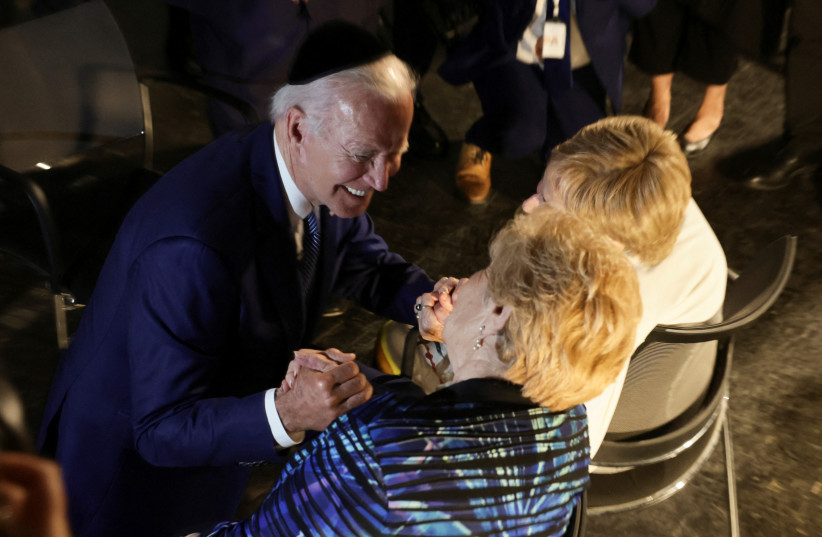Back in September, when she was updating her October and November engagements in her diary, child Holocaust survivor Rena Quint was under the impression that she would be very busy in the fourth quarter of the year.
The dates were filling up, with in-person talks to groups at Yad Vashem, at hotels where groups were staying, or as visitors to her home; the hosting in her home in Jerusalem of other groups in the Shabbat of a Lifetime project; and several interactive sessions on Zoom.
If the name rings a bell, Quint was one of the survivors chosen by Yad Vashem to meet with US President Joe Biden when he visited Israel in July 2022.
An articulate speaker, Quint has been in high demand by local and overseas groups whose members wanted to hear the first-hand story of a Holocaust survivor who had lived in a ghetto and in a concentration camp; and had been protected from death by a series of adults; and was the sole survivor of her immediate family.
Americans in particular identify with her because she speaks English with an American accent devoid of any European overtones or undertones.

Now in her mid-eighties, Quint has made it her life’s mission to tell her story because she ardently believes in the importance of keeping the memory of the Holocaust alive in people’s minds to ensure that it would not happen again.
Over the past month, she has been participating in some of the volunteer activities on behalf of soldiers and of people evacuated from the North and South of the country.
She now has the time to do that. The reason: cancellations. All of a sudden groups that were scheduled to come to Israel from the United States, South Africa, and Germany, canceled their trips – and not just because of the October 7 massacre and the fragile security situation in its aftermath.
The cancellations had already begun just before Rosh Hashanah. Quint had been scheduled to speak to a group of Evangelists, a civic group, a student group, a women’s group, and more. But all canceled their visits to the Holy Land.
She could understand the reluctance of some of these groups to come to Israel in the present security climate. What she can’t understand is the cancellation of Zoom events. She is particularly irked by the cancellation of Zoom events by academic institutions.
She cites an example of one in which there are very few Jewish students. One of these Jewish students had been on a trip to Israel last year, and Quint had spoken to members of the group with which he had been traveling.
The student had been impressed and thought that perhaps some of his non-Jewish friends might be interested in hearing Quint tell her story. Indeed they were and the date was fixed and Zoom arrangements were made – but they came to naught.
THE DEVASTATED student, whose name and university Quint asked not to be published because she doesn’t want to cause him any trouble, wrote to Quint, explaining: “I recently received some appalling news. Due to recent events in the Middle East, my school is now saying that they can’t have you come to speak about our experiences in the Holocaust. I am furious with the school and tried to get them to change this decision, but couldn’t.”
H<strong>amas and the Holocaust</strong>
Whether or not Jews associate the intention of Hamas to wipe Israel off the face of the map with the “final solution for the Jewish problem,” it seems that some non-Jews do see the connection, and don’t want to be perceived as taking sides in the current conflict.
Quint attributes this to ignorance of history. When participants in pro-Palestinian demonstrations chant “From the river to the sea, Palestine will be free,” Quint doubts that most of them know which river and which sea. But the chant refers to the area between the Jordan River and the Mediterranean Sea, which includes Israel and the West Bank, Gaza, and the designated Palestinian territories.
In essence, that means no Israel, and taken a step further given Palestinian animosity towards America, it means no Jews, because the world’s largest Jewish population outside of Israel is in the United States where Quint grew up after the Holocaust.
What gives her some degree of comfort and cause for hope is the fact that unlike in Europe where Jews had sporadic resistance groups but no army, today Israel has an army in which 12 of her grandsons are fighting.
Quint makes no distinction between her biological grandsons and the husbands of her granddaughters. To her, they are all family, and while she worries about them, she is also very proud to see them in uniform.
Though some groups may now be hesitant about listening to her story and her views, the media remains interested. Since the start of the war, she has been interviewed by Time magazine, NBC, and CNN, and this week received a request from a German television crew that had previously interviewed her at her home and at Yad Vashem, but now wants to get her take on Operation Swords of Iron.
From Quint’s perspective, it is important to link Swords of Iron with the Holocaust, because the aim of both is the destruction of the Jewish people.
She has been amazed over the years to learn that there are people who have never heard of the Holocaust, let alone the number of Jews and non-Jews who were murdered, and the number of soldiers who fell in battle, or the physical destruction of villages, towns, and cities.
This is of great concern to her, because if you don’t know history, you can’t recognize the signs when it is about to repeat itself.
